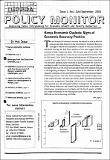Policy Monitor, Issue 1 No. 1, July-September 2003 on Improving Public Policymaking for Economic Growth and Poverty Reduction
View/
Publication Date
2003Author
Type
KIPPRA Publicationsviews
downloads
Metadata
Show full item recordBy
The Kenya Institute for Public Policy Research and Analysis (KIPPRA)
Abstract/
The much expected economic recovery has started to pick up albeit at a slower pace than foreseen in the Government's Economic Recovery Strategy for Wealth and Employment creation for this year. Economic indicators covering the first three quarters of the year suggest that the economy is likely to grow by about 1.8% this year and 3.6% in 2004. This growth will be marginally lower than the previously published forecast of 2% for 2003 and 3.7% for 2004. The downward adjustment of GDP growth is as a result of two major factors. First is the constrained consumer spending. The consumer spending earlier expected to partly underpin the recovery is now likely to suffer from the high overall inflation. The current overall inflation forecast for 2003 is at 10%, which is an upward revision of the inflation forecast at the beginning of the year. The positive effect of the reduction in VAT in consumer spending will be undermined by the more than expected higher inflationary pressures. The other factor leading to the downward adjustment in the earlier forecast is the slow pace of the earlier expected rapid public infrastructure programmes. Spending in infrastructure is going to be lower than expected since the anticipated inflows resulting from the resumption of the Poverty Reduction and Growth Facility which were to be spent on infrastructure programmes are not likely until the fourth quarter of 2003. Still, major investments in the housing sub-sector, which were expected in 2003 may not be forthcoming until 2004.

